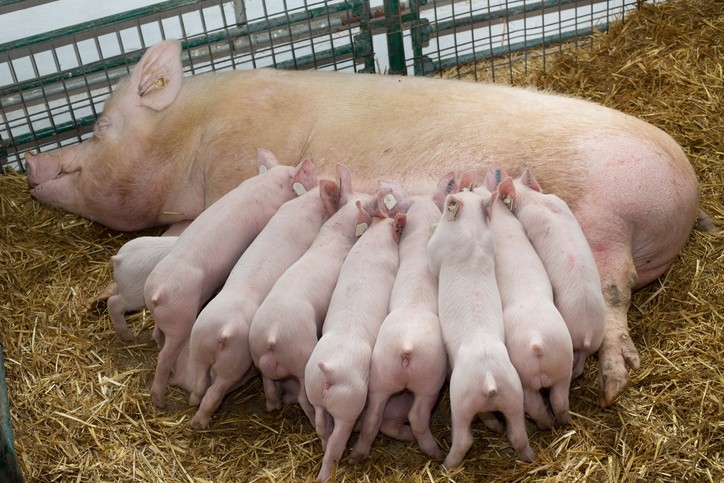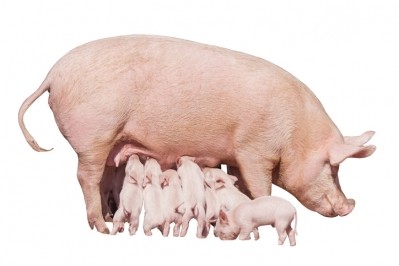Canola meal diets may support sow, piglet performance

A team of researchers from the University of Manitoba examined the use of canola meal (CM), both with or without enzymes, as the primary protein source in diets for sows during gestation and lactation. The team published its work in the journal of Animal Feed Science and Technology.
“The objectives of this study were to determine the effects of a high dietary CM inclusion with or without a multi-enzyme complex (MC) from early gestation through to lactation on lactation performance, milk composition, potential gut health benefits and nutrient digestibility of sows and suckling piglet performance,” the researchers said.
The research group found that canola meal can be used as a main dietary protein during gestation and sow lactation. Adding an enzyme to the diet limited sow bodyweight loss and boosted phosphorus digestibility.
“Up to 300 g/kg CM can be included in sow diets as a sole protein source from early gestation until weaning without affecting sow and suckling piglet performance, and energy and nutrient digestibility, along with an increase in the abundance of beneficial bacteria in the gut,” the researchers said.
Canola meal
Canola meal is used as a supplemental protein in swine diets during the phases of swine growth, said the researchers. Compared to soybean meal, it has less crude protein (CP) and amino acids (AA) but triple the amount of fiber.
Recent strains of CM have less glucosinolate, but the fiber level has kept it from being a major protein source in swine diets, they said. However, diets manufactured based on net energy (NE) and standardized ileal digestible amino acid levels have been found to maintain swine performance when using fibrous ingredients.
For sows, lactation is a catabolic phase where lipid and protein catabolism pull from body tissue to address any shortfall in nutrients for milk synthesis, they said. Nutrients provided during gestation need to fill body reserves so the sow can meet lactation needs.
Nutritional management during gestation also can maximize the piglets born to a sow every year, sow longevity, immunity and milk production, they said.
However, using CM as the primary or only protein source in sow diets has not been examined, said the researchers. But, available literature suggests that 100-200g/kg CM could be added to diets in gestation and lactation without altering sow or piglet performance.
A previous study looking at the use of 300g/kg CM in lactation diets was found not to hinder performance although nutrient digestibility and energy were limited, they said.
“Since pigs have shown to adapt better with a longer period of feeding of fibrous diets, we hypothesized that with a longer adaptation period, CM could be used as a major protein source in sow diets without any negative effects on nutrient digestibility,” they said. “However, there has been little, if any, research conducted to evaluate the effects of feeding high levels of CM during gestation, on lactating sow and piglet performance.”
The research team hypothesized that optimal performance could be supported while using canola meal diets formulated on NE and AA values from gestation through lactation and that adding supplemental enzymes would boost energy and nutrient digestion, they said.
Feeding trial details
In the feeding trial, 45 sows and their litters were given one of three diets for a period of 76 days, the researchers said. Piglets were cross-fostered so every sow had about 12 piglets, and they were weaned at 21 days.
The diets were formulated to have similar standardized ileal digestible AA levels and NE values, they said. The trial diets included a corn-soybean meal based control diet, the control diet with 30% solvent-extracted CM replacing soybean meal and without an enzyme, or the corn and CM diet with a multi-enzyme complex (MC).
The amount of feed provided and feed refusals were recorded and average daily feed intake (ADFI) was calculated, they said. Sow bodyweight (BW) and backfat depth were checked on days 60, 111 of gestation, after farrowing and at weaning, and the weaning to estrus interval also was recorded.
Colostrum and milk samples at weaning were collected for analysis, along with blood, they said. Fecal samples were taken on days 10, 11 and 12 post-farrowing to check for dry matter content, gross energy, nitrogen content, CP, neutral detergent fiber (NDF), calcium and phosphorus (P) and apparent total tract digestibility (ATTD) was calculated.
Additionally, fecal samples were collected from a selection of sows on days 60-90 of gestation and day 21 post-farrowing to check for bacterial genomic DNA, said the researchers.
Results
Overall, the CM diets were found to support “satisfactory” sow and piglet performance while maintaining energy and nutrient digestibility, the researchers said.
The trial diets were not found to alter ADFI, weaning to estrus interval, milk fat, protein or lactose composition, they said. Backfat loss was similar, except during lactation when sows fed the CM diet with enzymes lost less backfat.
There was no effect from diet on piglets born alive, stillborn, mummies, weaned piglets or piglet overall average daily gain, they said. Piglet daily gain tended to be higher on days 0-21 post farrow for those with sows getting a CM diet.
Sow colostrum and milk were similar for milk fat, protein and lactose composition, they said. However, sows getting the CM diets had reduced plasma urea nitrogen (PUN) levels at weaning.
ATTD was similar among the diets except for phosphorus, where sows getting the enzyme-supplemented MC diet had higher digestibility, said the researchers.
There were no differences on the amounts of bacteria found on day 60 of gestation or at day 21 post-farrowing, they said. “Sows fed CM-containing diets with or without MC had greater abundances of bacteria belonging to Lactobacillus and Enterococcus and lower abundances of Firmicutes when compared to those fed the control diet on day 90 of gestation,” they added.
Source: Animal Feed Science and Technology
Title: Effect of canola meal inclusion as a major protein source in gestation and lactation sow diets with or without enzymes on reproductive performance, milk composition, fecal bacterial profile and nutrient digestibility
Authors: D. Velayudhan, M. Hossain, A. Regassa, and C. Nyachoti
DOI: doi.org/10.1016/j.anifeedsci.2018.05.001















